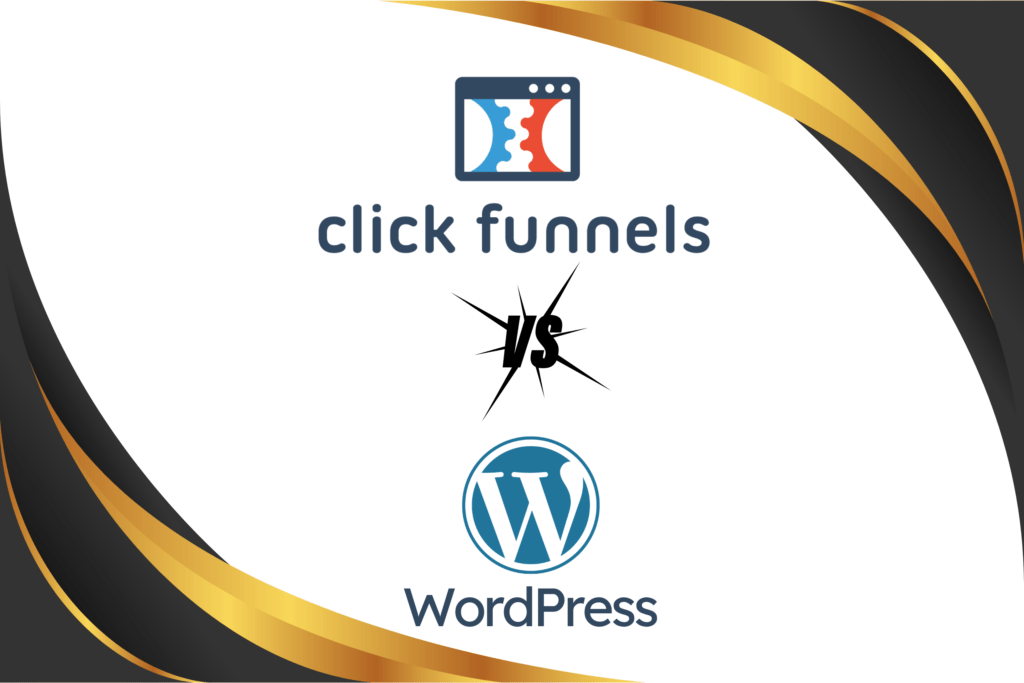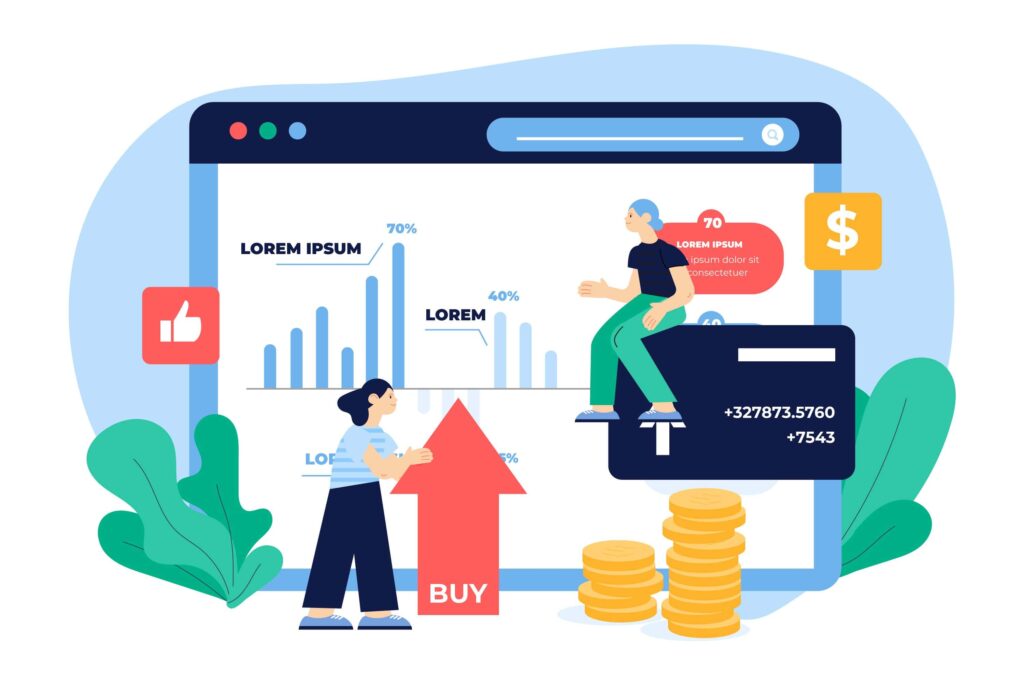In the digital world, building an online presence is crucial for businesses of all sizes. But when it comes to choosing the right platform, two options often come to mind: ClickFunnels and WordPress. While both can help you establish a web presence, they cater to very different goals. This blog will shed light on the key differences between ClickFunnels vs WordPress to help you make an informed decision.
- Understanding the Core Focus
- ClickFunnels vs WordPress: A Comparision Table
- Choosing the Right Platform: ClickFunnels vs WordPress
- 1. Features and Functionality
- 2. Design and Customization
- 3. Content Management
- 4. Scalability and Growth
- 5. Cost Consideration
- 6. Learning Curve
- 7. Security
- Can You Use Both Together?
- Conclusion on ClickFunnels vs WordPress
Understanding the Core Focus
ClickFunnels

ClickFunnels is a sales funnel builder. It’s designed to streamline the customer journey, guiding visitors towards a specific action, like making a purchase or signing up for an email list. ClickFunnels offers pre-built templates and a drag-and-drop interface, making it easy to create landing pages, opt-in forms, and other sales funnel elements.
WordPress

On the other hand, WordPress is a content management system (CMS). It’s a versatile platform allows you to build any website, from simple blogs to complex e-commerce stores. With WordPress, you have more control over design and functionality, but it requires a steeper learning curve.
ClickFunnels vs WordPress: A Comparision Table
Here’s a quick comparison table to summarize the key differences:
| Feature | ClickFunnels | WordPress |
|---|---|---|
| Primary Focus | Sales Funnels | Websites |
| Ease of Use | Easier to use, drag-and-drop interface | Little complex, and requires some technical knowledge |
| Customization | Limited customization options | Highly customizable with themes and plugins |
| Content Management | Basic blogging features | Robust content management capabilities |
| Cost | Monthly subscription fee | Free software, but requires hosting and pro theme/plugin costs (You can also use free themes and plugins) |
| Integration | Provides some tool integrations, but not as many as WordPress | Easily integrate with any 3rd party tool using its plugin or with many thousands of plugins available |
| SEO Friendly | Provides only some basic SEO tools | Incredibly SEO-friendly, with a large number of free plugins available for optimization |
| eCommerce Support | Built-in eCommerce features that are restricted to what ClickFunnels offers | Integrates seamlessly with other eCommerce tools and WooCommerce |
Choosing the Right Platform: ClickFunnels vs WordPress
Picking the right platform goes beyond just the core focus. Here’s a detailed breakdown of factors to consider when choosing between ClickFunnels and WordPress:
1. Features and Functionality
- ClickFunnels: ClickFunnels shines in its ability to create various funnel elements:
- Landing pages: Optimized pages designed for a specific conversion goal, like capturing leads or promoting a product.
- Order forms: Secure forms for processing customer transactions.
- Membership sites: Deliver exclusive content or courses behind a paywall.
- Email marketing tools: Manage email lists and send targeted campaigns.
- Analytics and tracking: Monitor funnel performance and optimize conversions.
- WordPress: WordPress offers a broader range of features through its vast plugin ecosystem. Here are some popular plugins that extend functionality:
- WooCommerce: Transform your website into a full-fledged e-commerce store.
- Elementor: A drag-and-drop page builder for creating custom layouts without coding.
- Yoast SEO: Optimize your website for search engines to improve organic reach.
- MemberPress: Create membership sites and restrict content access for paying members.
- Formidable Forms: Design custom forms for lead capture, surveys, and contact applications.
2. Design and Customization
- ClickFunnels: ClickFunnels provides a decent selection of pre-built templates for landing pages and sales funnels. However, customization options are limited compared to WordPress.
- WordPress: WordPress offers a vast library of free and premium themes that define the overall look and feel of your website. Additionally, plugins like Elementor grant extensive control over page layouts and design elements.
3. Content Management
- ClickFunnels: ClickFunnels has basic blogging features for creating announcements or short updates. It’s not ideal for managing a content-heavy website.
- WordPress: WordPress excels in content management. You can easily create blog posts, pages, categories, and tags for a well-organized website structure. Built-in revision history and scheduling features make content management efficient.
4. Scalability and Growth
- ClickFunnels: ClickFunnels pricing plans have limitations on the number of funnels, pages, and contacts you can manage. As your business grows, you might need to upgrade to a more expensive plan.
- WordPress: WordPress itself is highly scalable. You can start with a basic hosting plan and upgrade to more powerful servers as your website traffic increases. The modular nature of plugins allows you to add functionalities as needed.
5. Cost Consideration
- ClickFunnels: ClickFunnels operates on a monthly subscription model with different tiers offering varying features and limitations.
- WordPress: WordPress is free software. However, you’ll need to pay for website hosting and potentially for premium themes and plugins. The overall cost can vary depending on your specific needs.
6. Learning Curve
- ClickFunnels: ClickFunnels offers a user-friendly drag-and-drop interface, making it easier to learn for beginners with no coding experience.
- WordPress: WordPress has a steeper learning curve, especially for those unfamiliar with content management systems. However, there are numerous resources and tutorials available to help you get started.
By carefully evaluating these factors alongside your website’s purpose and goals, you’ll be well-equipped to choose the platform that empowers your online presence.
7. Security
- ClickFunnels: ClickFunnels handles security measures on their servers.
- WordPress: WordPress is open-source software, which means the core software itself is generally secure. However, the security of your WordPress website ultimately depends on the hosting provider, chosen themes and plugins, and your security practices.
Can You Use Both Together?
Absolutely! ClickFunnels and WordPress can be complementary tools. You can use ClickFunnels to build your sales funnels and integrate them seamlessly with your WordPress website. This allows you to leverage the strengths of both platforms.
Conclusion on ClickFunnels vs WordPress
- ClickFunnels is ideal for: Businesses focused on lead generation and sales. Entrepreneurs who want a user-friendly platform to build sales funnels quickly.
- WordPress is ideal for: Businesses that need a full-fledged website with extensive content and functionality. Bloggers who want a platform for content creation and management.
ClickFunnels and WordPress are both powerful tools, but they serve different purposes. Consider your specific needs and goals when choosing the right platform for your website. If you’re unsure, there are also free trials available for both ClickFunnels and WordPress, so you can experiment and see which one feels more comfortable.
Read More:
How To Sign a PDF Document With Digital Signature Certificate?





